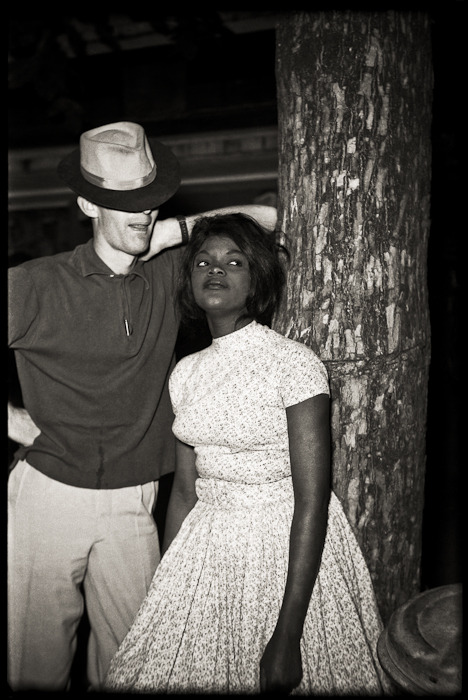In the September 2012 issue of Aperture, Carole Naggar writes about the 1950s and 60s photographs of Jean Depara, an Angolan photographer living (in exile) in Congo.
A Belgian colonial law in Congo made it a crime for Africans to photograph outdoors; as a result, Congolese photographers worked primarily in indoor portrait studios. Jean Depara ran one of the most successful of these, the result of his role as personal photographer of local musical superstar Franco, aka "the sorcerer of the guitar."
When Congo gained independance in 1960, photographers, including Depara, took to the streets. My favorite Depara photos of these times are of the nightclubbing Congolese woman around the many evocatively-named bars and clubs in Kinshasa in the 1960s (the Afro Negro, the Oui, the Fifi, the Djambo-Djambu, the Binga Bar, etc.). For undoubtedly the most beautiful women in the world are the most self-assured, the strongest, the most free. And the best nightclubs in the world--the only real nightclubs--are the ones that allow you to be your most self-assured, your strongest, your most free, if only for the night. (Grace Jones' cover of David Bowie and Iggy Pop's "Nightclubbing" evokes this best.) Depara's portraits reveal this powerful intersection of beauty, music, self-expression, and the night.
From Naggar's Aperture essay: "In most African languages, there is no word for the European concept of music--as if it is so omnipresnet in everyday life that it does not need to be named. Not so in the Democratic Republic of the Congo; there. the term ndouma designates music. To say that a woman is desirable, the Congolese describe her as o-ndouma; harmonious, musical."



A Belgian colonial law in Congo made it a crime for Africans to photograph outdoors; as a result, Congolese photographers worked primarily in indoor portrait studios. Jean Depara ran one of the most successful of these, the result of his role as personal photographer of local musical superstar Franco, aka "the sorcerer of the guitar."
When Congo gained independance in 1960, photographers, including Depara, took to the streets. My favorite Depara photos of these times are of the nightclubbing Congolese woman around the many evocatively-named bars and clubs in Kinshasa in the 1960s (the Afro Negro, the Oui, the Fifi, the Djambo-Djambu, the Binga Bar, etc.). For undoubtedly the most beautiful women in the world are the most self-assured, the strongest, the most free. And the best nightclubs in the world--the only real nightclubs--are the ones that allow you to be your most self-assured, your strongest, your most free, if only for the night. (Grace Jones' cover of David Bowie and Iggy Pop's "Nightclubbing" evokes this best.) Depara's portraits reveal this powerful intersection of beauty, music, self-expression, and the night.
From Naggar's Aperture essay: "In most African languages, there is no word for the European concept of music--as if it is so omnipresnet in everyday life that it does not need to be named. Not so in the Democratic Republic of the Congo; there. the term ndouma designates music. To say that a woman is desirable, the Congolese describe her as o-ndouma; harmonious, musical."



